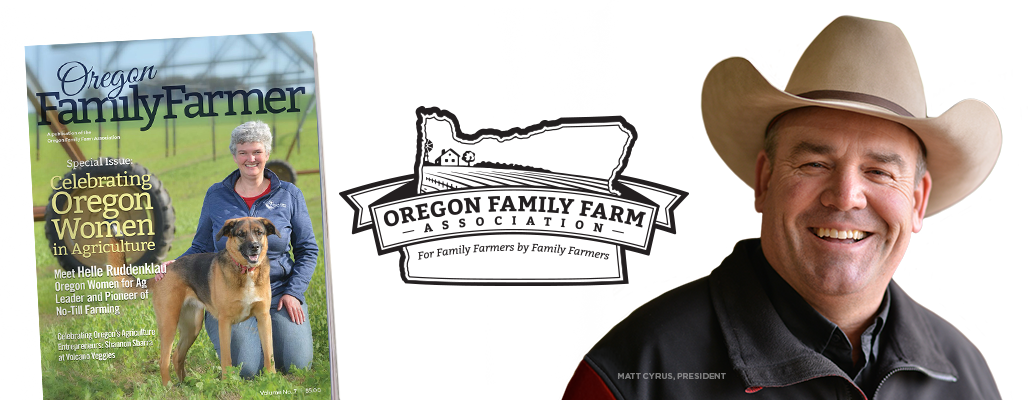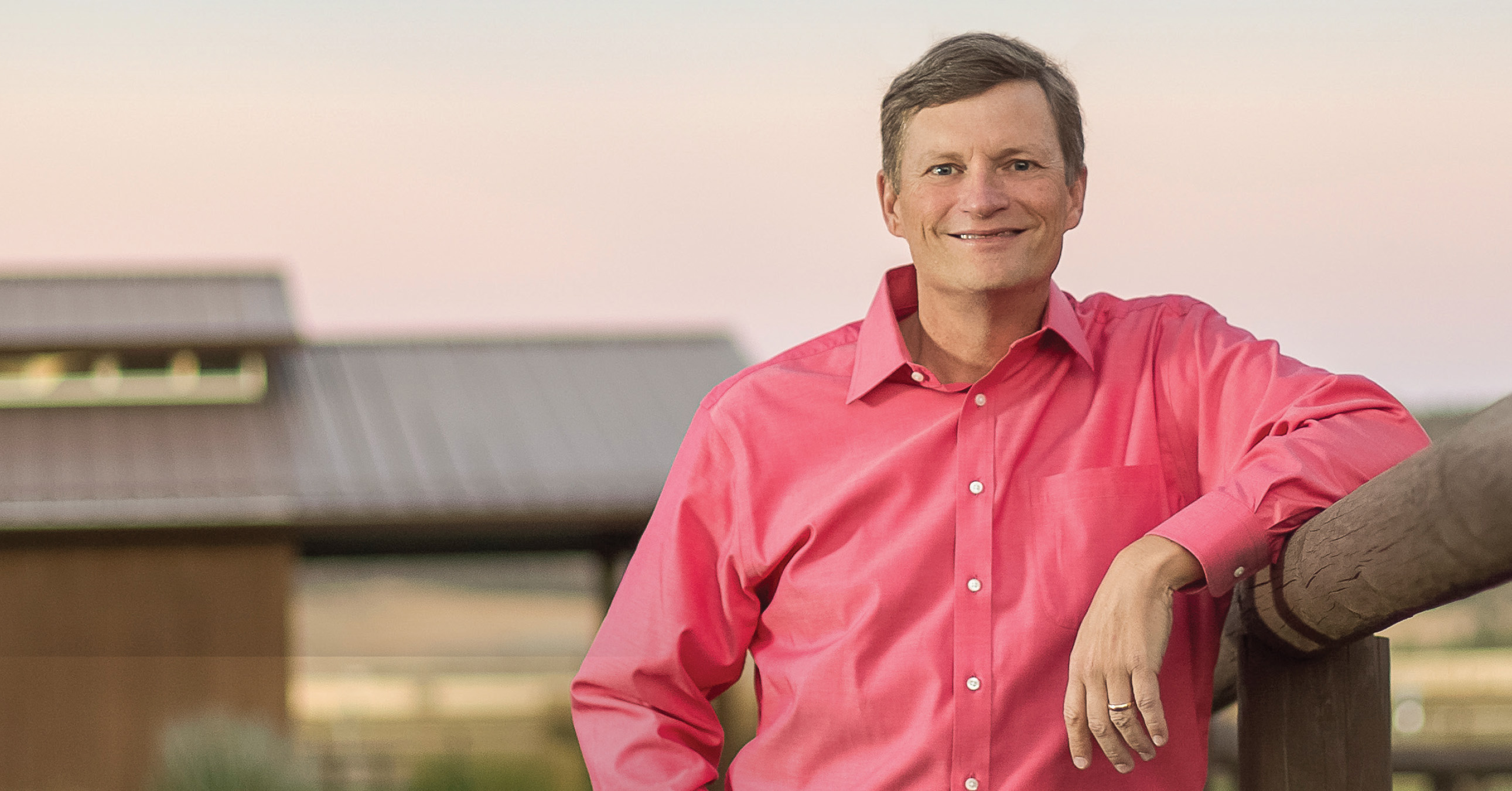BY NAOMI INMAN
Meet representative Mike McLane: Lawyer, legislator, publisher, Air national guard jag, and Champion of the Oregon farmer.
The summer of 2017 sizzled on every side for Rep. Mike McLane — lawyer, legislator, publisher, and Air Guard JAG — who has served in the state legislature since 2011 and represents most of Central Oregon.
It wasn’t just forest fires and solar eclipse traffic jams for Mike. Summer began with hot debates on the transportation package and balancing Oregon’s budget. More sizzle was added as the three-term Republican House caucus leader caught the notice of the Trump administration, as a leading candidate for U.S. Attorney for Oregon — the state’s top federal prosecutor.
News about Mike ran in papers statewide, attracting Oregon’s biggest conservative activists and financial backers, who asked Mike to consider running for governor — a request that usually goes the other way around.
Although Mike has since ruled out an immediate run for governor, one quickly realizes Mike McLane is the face of Oregon’s future in one way or another.
For now, he has bigger fish to fry. He’s sticking with the legislature and told The Oregonian, “Oregon desperately needs solutions to serious problems caused by one-party rule in Salem. I don’t want to be a cause for division that could hurt the chances for real change in 2018.”
He’s staying at bat for real change.
His dogged commitment to real change is evidenced in numerous legislative accomplishments, among them the Small Business Tax Cut of 2013, the Water Supply Initiative (2013, 2015), and the Data Center Bill (2012, 2015). A life-long advocate for the people of rural Oregon. He gets fired up just talking about it, saying, “I first ran to be a voice for the rural poor.”
Central Oregon Eclipse
On the eve of the solar eclipse, Mike McLane found his patch of green lawn in Powell Butte dotted with tents. A dozen or more friends and family lounged on the trampoline, and hung from hammocks in anticipation of Central Oregon’s celebrated phenomenon.
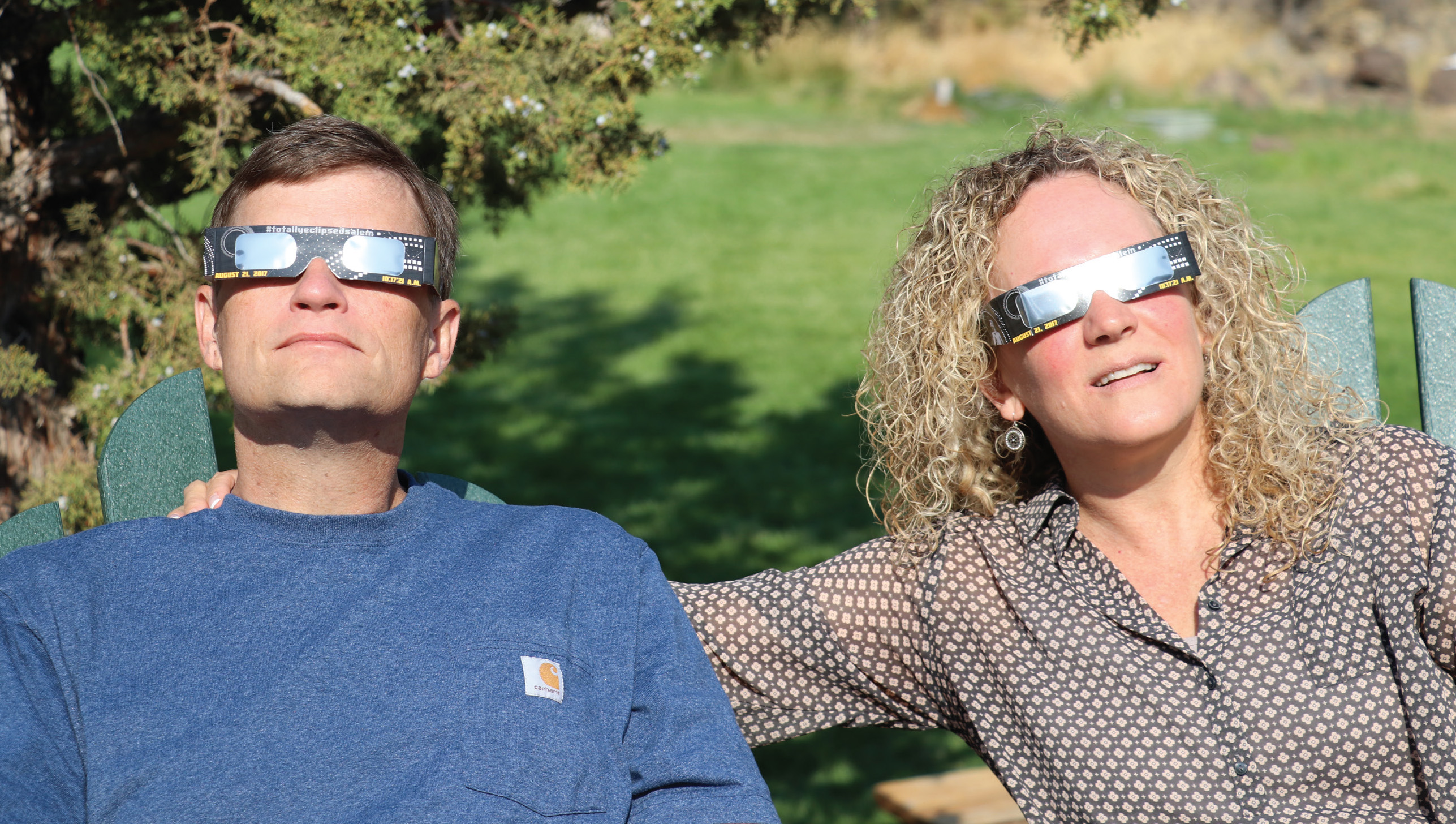 As luck would have it, the McLane homestead was prime eclipse real estate.
As luck would have it, the McLane homestead was prime eclipse real estate.
Posts fluttered across Facebook, including one of Mike and Holly, and their three grown “kids,” Ben (23), Jacob (20), and Mary (18) donning eclipse glasses. They shared their stories on the Facebook cloud — a “cloud” that sat literally less than two miles east of their small farm — the half-million square foot Facebook Data Center.
It was the very data center that their dad, Representative McLane, had so hotly debated in the legislature to make possible, in the middle of Oregon, in the middle of a recession.
“One type of farm I never expected my signature legislation to be about is server farms!” Mike laughs, “but I helped preserve the growth of the data center industry in Oregon. Prineville used to be known for timber and tires. Now it’s timber, tires, and technology.”
Mike never expected server farms to be part of his story, but the data center legislation is tell-tale of his motivations.
Among these driving forces are his life-long advocacy for Oregon farmers and rural communities; his quest to foster civil dialogue in the legislature; and his unflagging efforts to bring about bipartisan solutions to serious problems.
And — when you get to know State Rep. Mike McLane — you’ll quickly discover the fire in his belly is lit by people’s stories. “Every person you meet has a story,” he reminds. “It’s interesting how much we’re connected.”
What could be more about stories than welcoming Facebook to Central Oregon’s sunken living room? The 29-million-year-old, 25-mile-wide, caldera of Prineville.
Forging a deal for Facebook and Apple on otherwise unstoried sagebrush and rock is now a chapter of Mike’s legacy. If you leaf back through the pages, this thing called “politics” for Mike all started as a farmer’s son.
The Kid From Condon
Ask Mike where he first cultivated his political drive and passion for agriculture and you’ll find his aspirations are homegrown. Mike grew up in the century-old, farming community of Condon, Oregon (population 685), nestled on the wheat-swept plateau above the Columbia River.
“I have a great fondness for that little town!” he enthuses. “It was a charmed life in a lot of respects.” He played every sport because every sport needed players, and was elected chapter president for Future Farmers of America (FFA) at Condon High School.
His parents, Dick and Patty, farmed 360 acres of alfalfa across the river in Tri-Cities, Washington. His summers were spent moving irrigation pipe with his dad and suffering “hardship.” “I suffered the hardship of no television on the alfalfa farm,” he banters.
From the back porch of his Powell Butte home, he grills burgers for the family and warmly recalls his mom’s spiritual and bookish influence over him, saying “She taught me to read and think for myself.”
Coupled with his dad’s work ethic, mom’s influence turned Mike into a voracious reader of biographies, the Chip Hilton sports series, American History Illustrated, and Mad Magazine — what he calls “the two sides of my thinking: historical and zany.”
“A lot of these heroes I read about were legislators and lawyers, such as Abe Lincoln… and that greatly influenced me to study law.”
In his small town, politics was a team sport with spirited political discussion. “In a community like Condon,” he reflects, “you didn’t get to choose your teammates, you’re stuck with what you got… so it teaches you how to get along and respect people with different opinions.”
That ethic — of respecting opinions, forging agreements, and finding solid ground for the team — has become the warp and woof of his political makeup. As a teen in the 1980s, he remembers seeing how agriculture and rural communities needed a voice in Oregon. He felt the call to become an advocate.
“I’ve always had the understanding that, when the bandwagon gets going, injustice can happen,” he explains. “When everyone adopts groupthink, there’s a need for somebody to stand up and ask tough questions. I felt agriculture was on the receiving end of groupthink. Yet agriculture saves more lives than anything else I know.”
Mike Meets Holly
At their kitchen table in Salem, Mike and Holly look like two college kids. He’s wearing a navy blue sweatshirt with the Oregon state seal. Her red Jersey reads “Chin Up America!” If they were to run for Oregon’s first couple, they’ve had lots of practice.
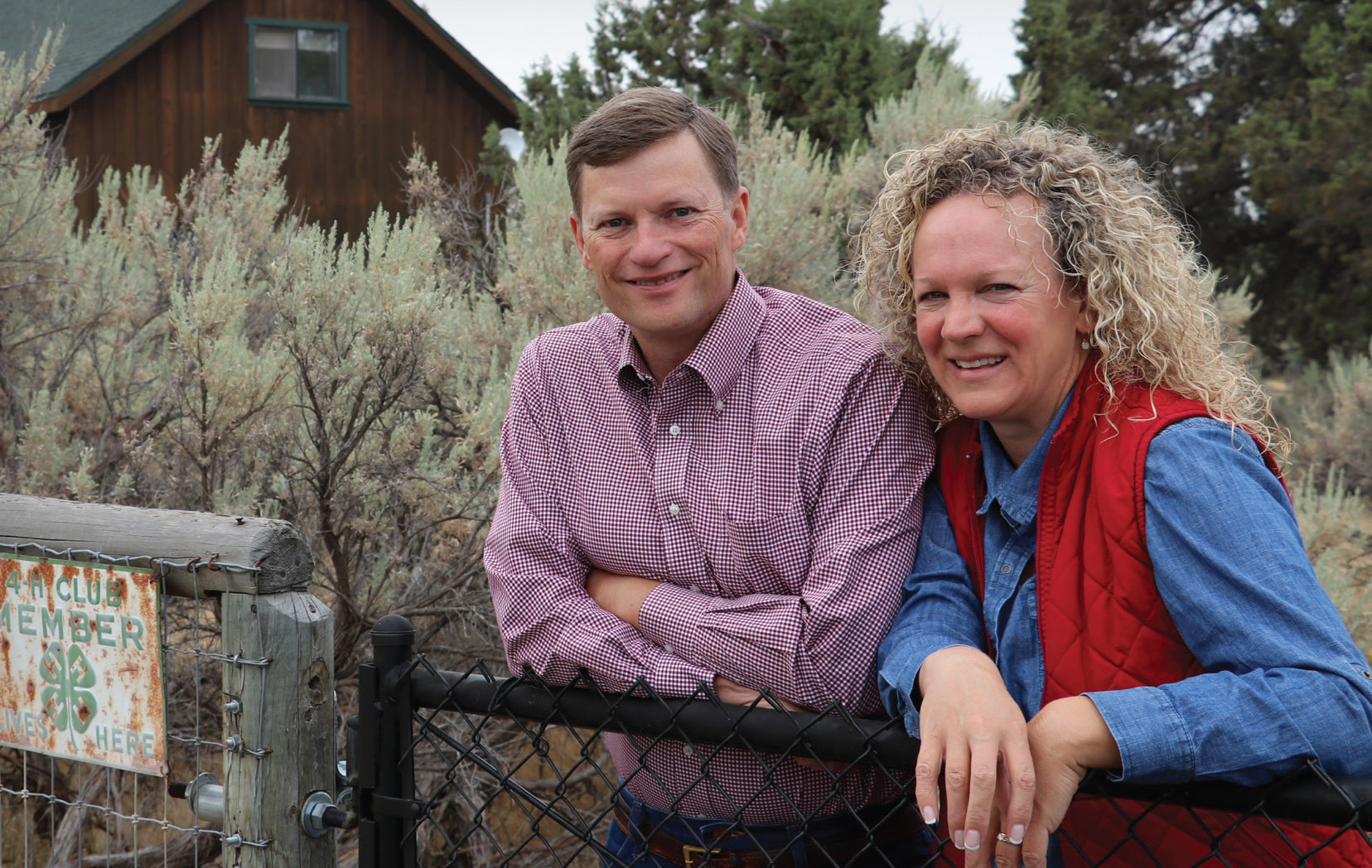 “On our 30th anniversary this June,” Mike recalls, “I was on the house floor fighting for a transportation package.”
“On our 30th anniversary this June,” Mike recalls, “I was on the house floor fighting for a transportation package.”
Sparks still fly in a room with this formidable duo. They banter and exude passion about Oregon, people, policies, and each other. While many of their era have a fondness for iconic fashions, music or movements of the 80s, Mike’s fondness veers toward one day especially.
“The first week of Spring Term in 1986 I was in the OSU bookstore,” he recalls. “I timed it just right to hit the checkout line next to Holly Craig.” He still has a glint in his eye telling the story and Holly still loves to hear it.
Mike first noticed Holly when his fraternity organized the FFA State Convention and Holly was a celebrity: the first female State President of Oregon’s FFA. Her leadership talent, blonde locks, and plucky personality got Mike’s attention. But, it was her faith and love for Oregon agriculture that sent cupid’s arrow — and sparks — flying.
By June 1987, Mike was holding a bachelor’s diploma in one hand (BA in Agricultural Economics, Minor in Geology) and a marriage license in the other, marrying Holly, and setting out to study law at Lewis & Clark College.
She finished college at Portland State University and went on trade missions with the Oregon Department of Agriculture Marketing Division. “I just loved marketing Oregon,” she remembers.
While Mike clerked in Salem with Oregon Supreme Court Justice Michael Gillette, Holly worked a bipartisan gig, as administrative assistant to both Democrat Vera Katz and Republican Kelly Clark.
Flying Rhinos Falling Towers
The 90s found Mike and Holly in urban Portland near Grant Park. Holly worked for the Oregon Film Commission and Mike worked in business law at Stoel Rives before assisting with prosecutions in Multnomah County Circuit Court.
In quick succession they had two sons, Ben and Jacob, and a daughter, Mary. They partnered in a fledgling publishing company, Flying Rhinoceros, with Holly’s high school friend and artistic talent, Ray Nelson. It blossomed quickly into a children’s curriculum publisher and an animated television series on CBS (Flying Rhino Jr. High, 1998-2000).
The dotcom crash of 2001 clipped the wings of their Flying Rhino venture. Then the unthinkable happened.
Mike remembers watching the twin towers fall on September 11, 2001, and making an instant decision. He joined the Oregon Army National Guard. Since 2005 he’s been certified both Army and Air National Guard and is currently the lead JAG (Judge Advocate General) in the state for Air National Guard.
“That’s when we started talking about a small farm experience for our kids,” says Holly, “to raise our kids like we were raised, to have a 4-H project, to raise a goat and a pig, and enter it in the county fair.”
“In 2003, we decided together with my brother Cameron to move our families to Central Oregon. My kids spent precious years with their uncle and cousins. My brother died in 2013 of colon cancer,” says Holly. “It paralyzed us for a while.”
“Our kids called him Uncle Fun,” Mike saddens. “He first called to tell me he had cancer when I was on the floor of the House. He was my best friend. Losing Cameron was the hardest thing I’ve ever experienced.”
Mr. Mike Goes To Salem
From the front passenger seat of his SUV, Mike points out the Facebook data center and talks about the local economy on his way to Prineville Men’s Wear for a new pair of jeans.
“When Holly said to me, ‘People are hurting and it’s time to run’,” Mike begins to share, “I knew it was time. We’ve always made decisions together. I was watching the devastation of central Oregon communities first hand. So many difficult stories.”
“I felt like the voice of those in agriculture, construction, small business — all needed someone in Salem who had walked their walk. I wanted small communities restored to their original beauty. I wanted to give our children options to raise their children where they want. Having technology East of the Cascades is important.”
“By 2009 we were just holding our breath,” said Holly, “watching job loss all around us, and my brother Cameron too. He had to move his family.”
One remnant of city life they transplanted from Portland was a tradition they had dubbed the Voters Pamphlet Parties, “with a healthy mix of Rs and Ds,” pipes Holly. Their parties had upwards of 50 people who came for “good food, good beer, and good political discussion.”
“Our goal was to create a space for civil dialogue and understanding where we could be informed about the issues and it was safe to debate and have differing opinions,” said Mike.
They assigned a ballot measure to each couple or individuals to research and present the pros and cons without revealing their true position. Then they’d vote on who did the best job.
“It was super interesting what you learned about people,” said Mike. “Someone even told me, ‘I never knew you were a damn liberal.’ But the reality was, I was just debating the opposing side.”
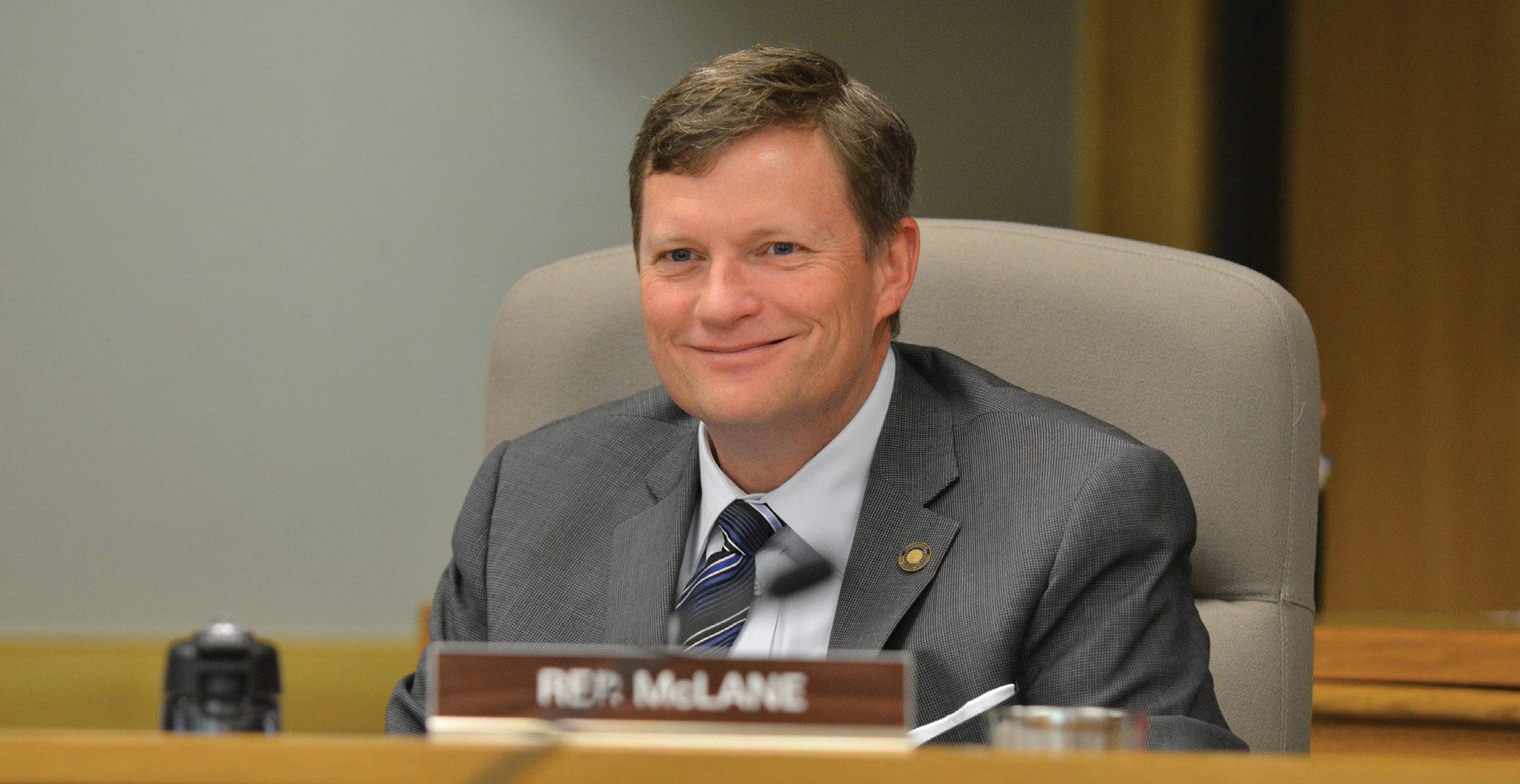 It was great practice for honing Mike’s leadership style: listening to all sides of the issues, caucusing, and building relationships. Mike ran for office in 2010, making job creation a main focus. In 2011, he was sworn in, chosen House Minority Leader in 2012, and reelected in 2012, 2014, and 2016.
It was great practice for honing Mike’s leadership style: listening to all sides of the issues, caucusing, and building relationships. Mike ran for office in 2010, making job creation a main focus. In 2011, he was sworn in, chosen House Minority Leader in 2012, and reelected in 2012, 2014, and 2016.
Picture From Powell Butte
Looking over the town of Prineville from Ochoco State Scenic Viewpoint, Mike paces excitedly, talking about promising future chapters for business and families in the region. He’s wearing an OSU Beavers polo shirt, hoping to catch the preseason football game against Colorado State at a local brewery.
On this August afternoon, smoke from the Millie and Nena fires obscure the panoramic view of mountains that normally dot the caldera’s horizon like jewels on a crown.
“This town went from the hardest hit town in the great recession, to near full employment,” he says, pointing towards Crook County’s historic Courthouse. “Now our schools are getting support from Facebook and Apple. Parents are attending parent-teacher conferences, becoming Little League coaches, coming to games. It’s looking like a system supported by the community!”
In the last six recession years, building and construction trades put in 9 million man hours of work in the growing data centers. Mike is grateful for the bipartisan support and friendships gained in the 2011 and 2012 legislative sessions, that resulted in the first “Facebook Bill.”
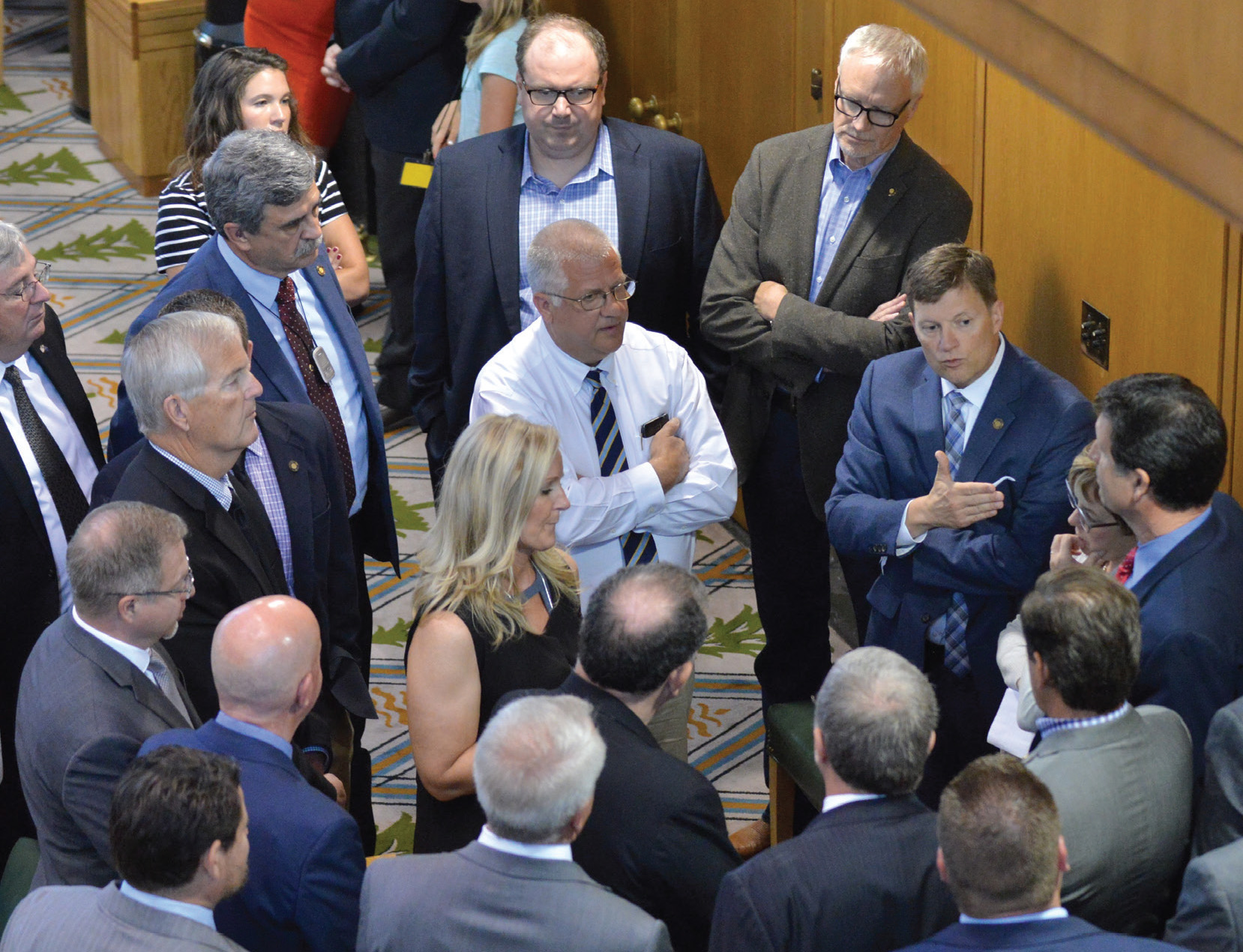 “I look back and think, that’s how Oregon should work. A Democrat from Beaverton should actually care about Prineville — about the stories of people east of the Cascades,” he remembers in working with Sen. Mark Hass (D, District 14).
“I look back and think, that’s how Oregon should work. A Democrat from Beaverton should actually care about Prineville — about the stories of people east of the Cascades,” he remembers in working with Sen. Mark Hass (D, District 14).
It becomes crystal clear, on this smoky day, that he sees every person as the hero of their own story, and their stories compelled Mike to run for office. These everyday heroes have fueled his three-hour commute to Salem for seven years and running. They continue to fuel his aspirations for statewide leadership.
On my way out the front door of his Salem home (nicknamed “the bunker”), I notice a large portrait of Harry Truman. It once belonged to Mike’s parents, who valued Truman’s farming roots and kinship for the common man.
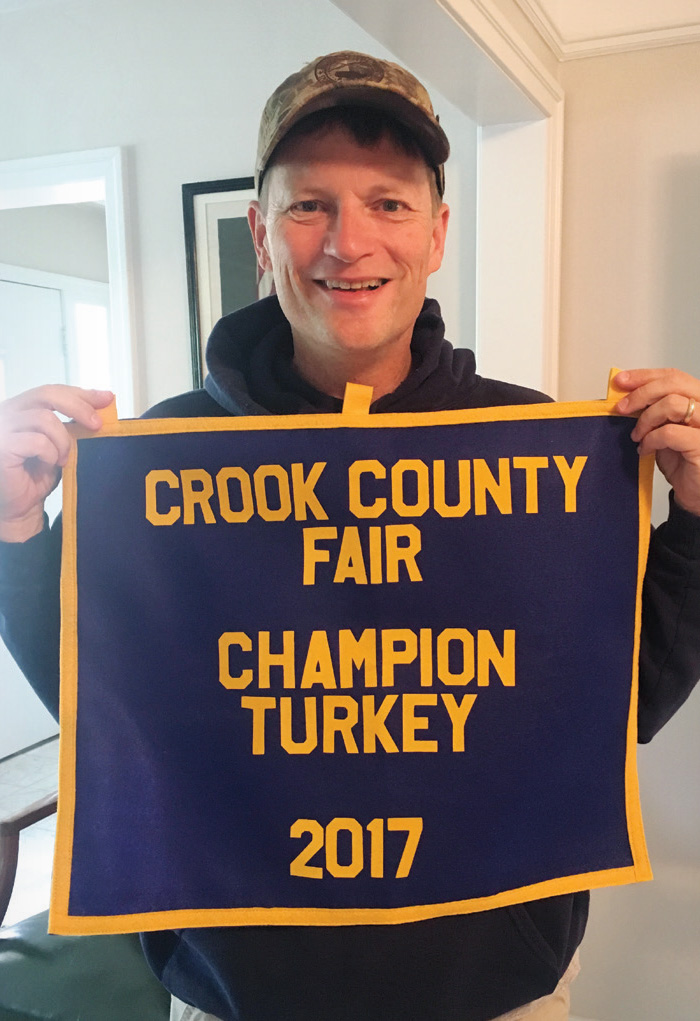 Then, in typical, fun-loving fashion, Mike quickly holds up a banner he won for buying a 37-pound turkey at the 4-H and FFA auction. It reads, “Crook County Fair, Champion Turkey 2017.” It’s an irresistible photo op, and Holly bursts out laughing. The two sides of his thinking, “historical and zany” seem to surface in many a serious moment.
Then, in typical, fun-loving fashion, Mike quickly holds up a banner he won for buying a 37-pound turkey at the 4-H and FFA auction. It reads, “Crook County Fair, Champion Turkey 2017.” It’s an irresistible photo op, and Holly bursts out laughing. The two sides of his thinking, “historical and zany” seem to surface in many a serious moment.
Mike won’t be running for governor this time around. But he keeps his eye on Oregon’s future, and doggedly advocating for Oregon’s everyday heroes. Should he and Holly one day find themselves as Oregon’s first couple, their oneness of purpose and passion for Oregon which now fill a room, will easily fill Mahonia Hall.
Funny thing. On February 26, 1979, Mike was living in Condon, Oregon. The path of totality for the solar eclipse passed over his home. It was cloudy that day and not much to see but two minutes of total darkness. But still, how lucky can one guy be?
